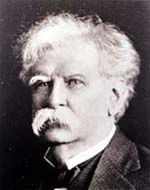|
Ethelbert Stewart
Ethelbert Stewart (1857–1936) was the commissioner of the U.S. Bureau of Labor Statistics (BLS) from 1921 to 1932. Stewart worked as a coffin-maker, then founded and edited labor newspapers. He was made the commissioner of labor for the state of Illinois in the 1880s.[1] He was made deputy commissioner of the BLS in 1913 along with other roles in the U.S. Department of Labor.[2] In that position he had a public role in how the organization should track women workers, child labor, and occupational injuries and illnesses. In the fall of 1913 he mediated a coal mining dispute involving the Rockefeller interests in Colorado and helped resolve the Indianapolis streetcar strike of 1913. It was hard to keep the Bureau staffed during World War I and Stewart advocated offering pensions to civil servants.[3] In 1920 he was elected as a Fellow of the American Statistical Association.[4] When commissioner Royal Meeker left in 1920, Stewart was nominated by President Woodrow Wilson to take the top role, newly elected President Warren Harding re-nominated him, and Stewart was confirmed in 1921. The Bureau began issuing productivity statistics in this period, and increased coverage of wholesale prices, employment and unemployment, and industrial safety statistics.[3][2] Publications and archives
References
|
||||||||||||||||||||||||||
